Media coverage
10 Things to Know About, RTE1 television
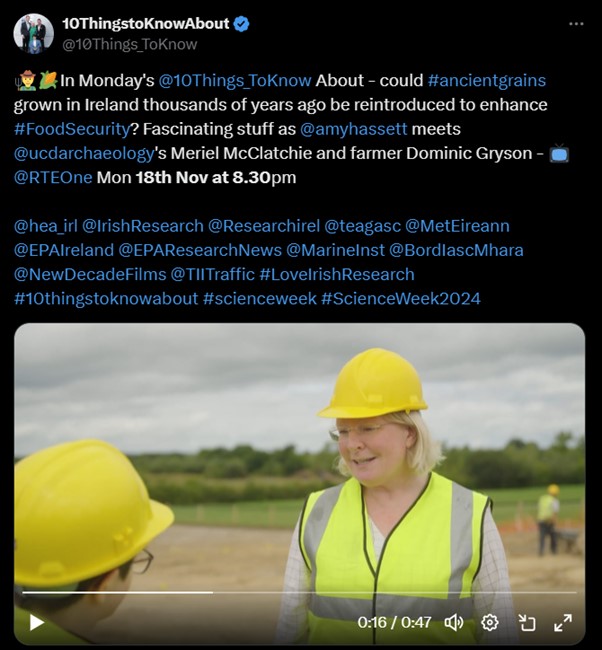
The CROPREVIVE project was featured on the RTE television series, (opens in a new window)10 Things to Know About, in an episode on food security that was broadcast on 18th November 2024. An excavation of a medieval settlement in Co. Limerick by (opens in a new window)AMS (as part of a (opens in a new window)TII road scheme), provided the perfect location for Meriel McClatchie to highlight how we recover archaeobotanical remains from archaeological excavations across Ireland, how this information can help us learn what farmers grew in Ireland's past, and how we can use this information to adapt farming for the future. You can view a short promotion video about the episode (opens in a new window)here (on X/Twitter).
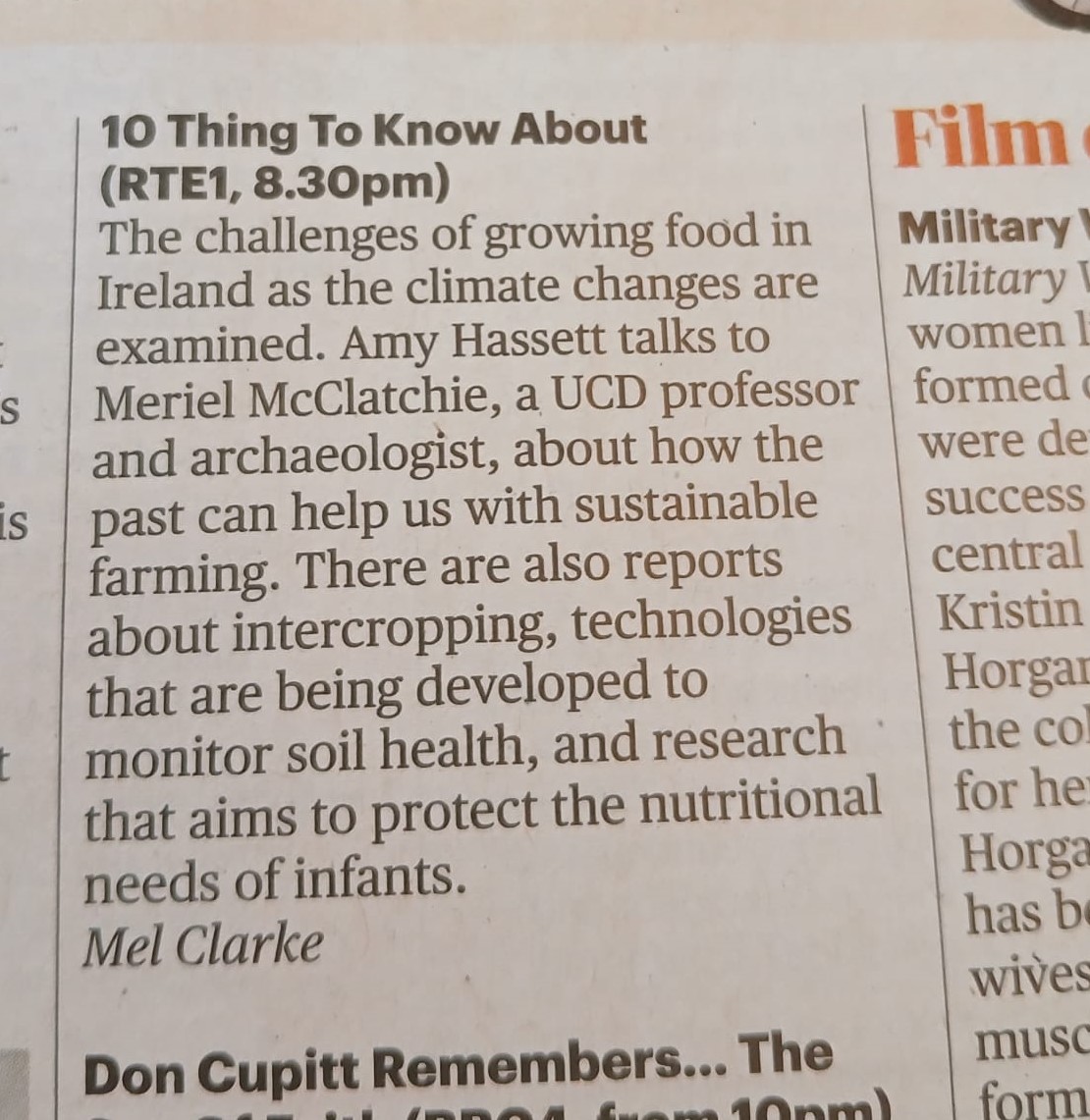
We were pleased to see that the episode was chosen as an upcoming TV highlight in the Sunday Times! (Critics' Choice, 17th November 2024)
- - - - - - - - - - -
St Brigid's Day, 2024
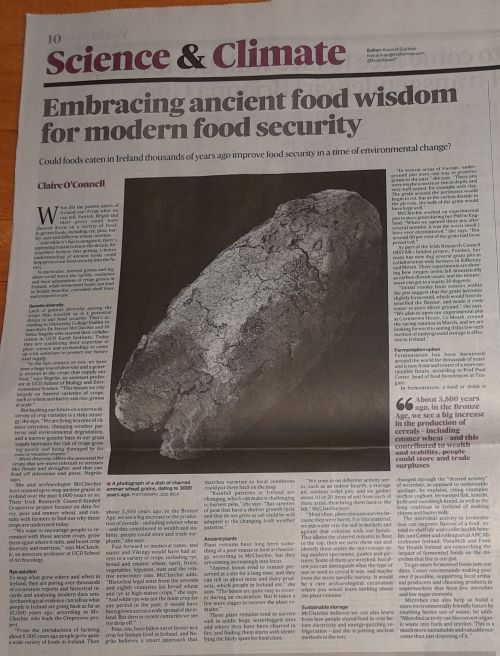
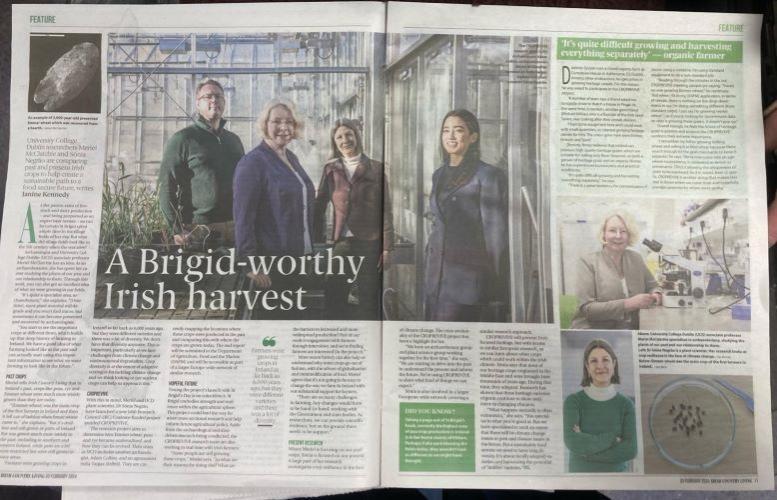
St Brigid's Day is celebrated on 1st February in Ireland. St Brigid is thought to have lived around 1500 years ago, and tales associated with St Brigid are often focused on farming and food production. Historically, people sought blessings and miracles from saints such as St Brigid, praying for bountiful harvests and fertile land and animals. Today we face new challenges in farming, such as decreasing crop diversity and the impacts of climate change. CROPREVIVE seeks to address these challenge by unlocking ancient farming practices, offering exciting and sustainable potential for present and future Irish agriculture and food production.
To mark St Brigid's Day in 2024, CROPREVIVE was (opens in a new window)featured in The Irish Times (top image) and (opens in a new window)the Irish Farmers Journal (image above).
- - - - - - - - - - - - - - - - - - - - - - -
Stakeholder event
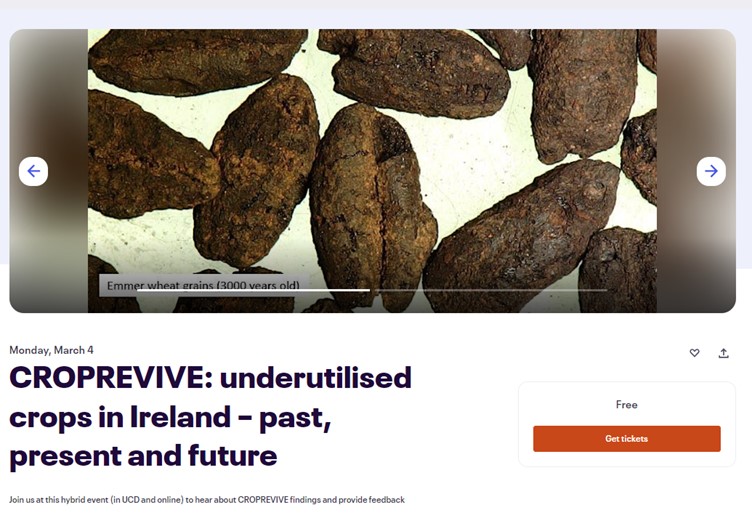
A stakeholder hybrid event was held at UCD and online on 4th March 2024. This was an opportunity for the CROPREVIVE team to share findings and receive feedback from farmers, seed merchants, agronomists, economists, food processors and producers, and state agencies. We learned about people's experiences with the target crops, difficulties in sourcing seed, the need to consider plant varieties versus populations, barriers to increased production and how to engage the public if new food products are developed. We are very grateful to everyone who participated in the event, and we look forward to incorporating the feedback into our project outputs.
- - - - - - - - - - - - - - - - - - - - - - -
Conferences

At the beginning of December, 2022, we displayed a poster to introduce the project at the annual conference of the Association for Environmental Archaeology, which took place in Glasgow. The AEA is the largest organisation of environmental archaeologists in Europe. The conference provided a great opportunity to share our concept and plans with a large number of colleagues.
In the summer of 2023, we presented our research at two major, international conferences. This enabled the team to gather valuable feedback on our approaches and initial findings.
In June 2023, Sofía Vargas Sielfeld presented a poster at IPSAM (Irish Plant Scientists' Association Meeting) in Belfast. This conference brings together a wide-ranging community of researchers in the plant sciences, phytopathology, plant genetics and genomics, ecology, plant phenology, horticulture, forestry, soil and rhizosphere science. Sofía’s poster was titled “Ancient crops in Ireland: a screening of peas, rye and emmer wheat production”. Due to the scarcity of emmer wheat production in modern Ireland, the poster focused on rye and peas, highlighting hotspots for cultivation. The poster also explored constraints - such as lodging for peas and ergot for rye - and potential solutions
In August 2023, Adam Collins presented an oral paper at the EAA (European Association of Archaeologists) conference in Belfast. The EAA is one of the largest meetings of archaeologists in the world, and the Belfast conference attracted more than 3000 participants. Adam’s paper was titled “Why won’t you eat your peas?! An interdisciplinary approach towards investigating underutilised crops”. The paper explored the long history of pea production in Ireland, highlighting its peak during the medieval period (AD 1150-1550), and comparing the location of ancient finds with modern practices. In August 2024, Adam presented another paper at the EAA (European Association of Archaeologists) conference in Rome. Adam's paper was titled "The changing fortunes of pea in Ireland over the last two millennia". Meriel McClatchie also presented a paper at the same conference. Meriel's paper was titled "Past, present and future farming systems: a perspective from the CROPREVIVE project".
In May 2024, Meriel McClatchie presented an oral paper at the Medieval Studies Research Group (MSRG) conference in Nottingham. The MSRG is a multi-disciplinary group that facilitates collaboration between archaeologists, historians, geographers and other interested parties who explore settlement in Ireland and Britain between the fifth and sixteenth centuries AD. Meriel's paper was titled "The cultivation of ‘minor’ crops at medieval settlements", and she drew upon CROPREVIVE data to investigate the rise and fall of rye and peas in medieval Ireland.
